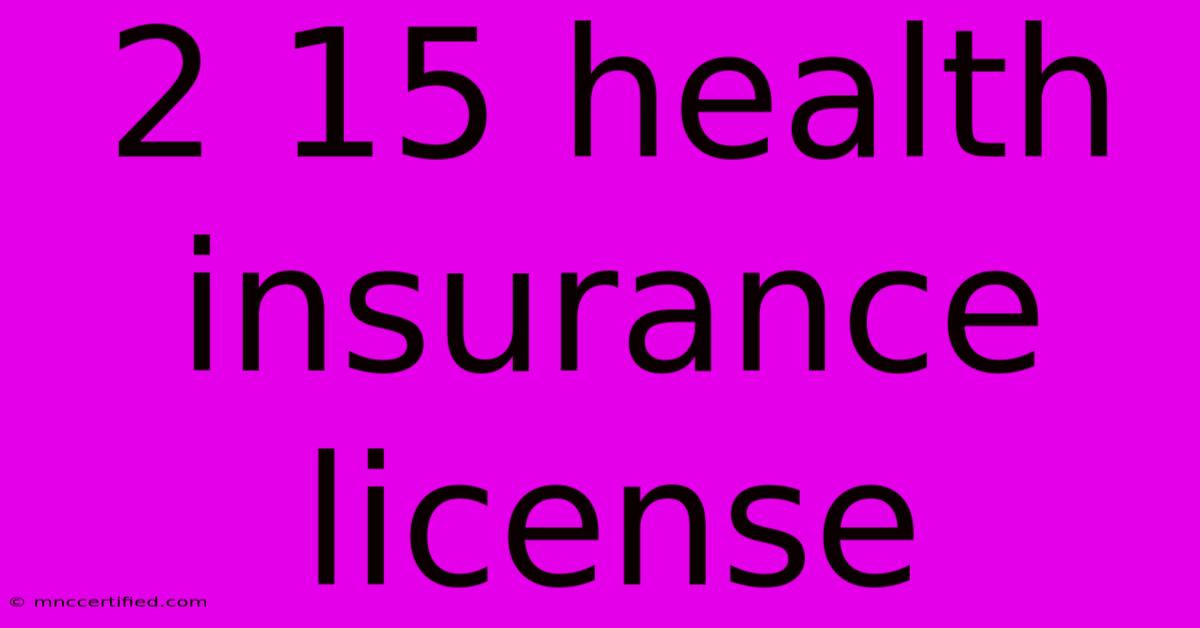2 15 Health Insurance License

Table of Contents
Navigating the World of 2-15 Health Insurance Licenses
Obtaining the right licenses is crucial for anyone working in the health insurance industry. This article focuses specifically on the 2-15 health insurance license, often a point of confusion for both aspiring and experienced professionals. We'll break down what it is, who needs it, how to obtain it, and the crucial steps to maintaining compliance.
What is a 2-15 Health Insurance License?
The term "2-15 health insurance license" isn't a universally standardized designation. It's more accurate to say it refers to a specific type of health insurance producer license that allows agents to sell particular products within a certain jurisdiction. The "2" and "15" are not necessarily literal numbers but rather represent categories or codes within a state's licensing system. These codes define the types of insurance products an agent is authorized to sell, often including:
- Accident and Health Insurance: This covers medical expenses resulting from accidents or illnesses.
- Medicare Supplement Insurance (Medigap): Plans that help cover the gaps in Original Medicare coverage.
- Long-Term Care Insurance: Provides financial assistance for extended care needs.
- Disability Insurance: Replaces income lost due to a disability.
Important Note: The specific types of insurance covered under a "2-15" designation (or its equivalent) vary considerably by state. You must consult your state's Department of Insurance website for the precise definition and requirements within your area.
Who Needs a 2-15 Health Insurance License (or its equivalent)?
This license, or its state-specific equivalent, is necessary for anyone who:
- Sells health insurance products: This includes agents, brokers, and other professionals involved in the sales process.
- Solicits health insurance: Engaging in any activity that encourages someone to purchase a health insurance policy requires the appropriate license.
- Advises on health insurance: Providing recommendations or guidance on health insurance plans necessitates licensure.
Essentially, if you're involved in any aspect of selling, soliciting, or advising on the types of insurance mentioned above, you'll need the relevant state license.
How to Obtain a 2-15 Health Insurance License (State-Specific Process)
The process of obtaining a health insurance producer license, often referred to as a "2-15" license in some regions, is state-specific. There is no nationwide license. Here are the general steps involved:
-
Check State Requirements: Visit your state's Department of Insurance website. Find the specific requirements for health insurance licensing, including eligibility criteria, application forms, and necessary fees.
-
Complete Pre-Licensing Education: Most states mandate completing a specific number of hours of pre-licensing education in health insurance. Ensure you complete a course accredited by your state's Department of Insurance.
-
Pass the State Examination: After completing your education, you'll need to pass a state-administered health insurance licensing examination. The content of the exam varies by state.
-
Submit Your Application: Complete the application form thoroughly and accurately, including any required supporting documents (e.g., background check, fingerprints).
-
Pay Licensing Fees: Submit the appropriate licensing fees as specified by your state.
-
Background Check and Fingerprinting: Many states require background checks and fingerprinting as part of the licensing process.
-
License Issuance: Upon successful completion of all steps, your state will issue your health insurance producer license.
Maintaining Your 2-15 Health Insurance License
Maintaining your license requires ongoing compliance. This typically involves:
- Continuing Education: Most states require continuing education credits annually to maintain your license.
- License Renewal: Renew your license before its expiration date to avoid penalties or suspension.
- Compliance with State Regulations: Stay informed about changes in state insurance regulations and adhere to all applicable laws and rules.
Failing to maintain your license can lead to penalties, including fines and suspension or revocation of your license.
Key Takeaways
Obtaining and maintaining a health insurance producer license (often referred to as a “2-15” license or a similar designation) requires diligent effort and adherence to specific state regulations. Always refer to your state's Department of Insurance website for accurate and up-to-date information. Failing to comply with these regulations could severely impact your career. Remember that the "2-15" designation is not a national standard; understanding your state's specific requirements is paramount.

Thank you for visiting our website wich cover about 2 15 Health Insurance License. We hope the information provided has been useful to you. Feel free to contact us if you have any questions or need further assistance. See you next time and dont miss to bookmark.
Featured Posts
-
Liverpools Konate Suffers Injury
Nov 29, 2024
-
How To Watch Heidenheim Vs Chelsea Match
Nov 29, 2024
-
What Is Tmj Zoe Balls Experience
Nov 29, 2024
-
Ex Broncos Qb Gets Giants Thanksgiving Nod
Nov 29, 2024
-
Cooper Rush Stats Salary Cowboys Qb
Nov 29, 2024